#california labor laws
Text
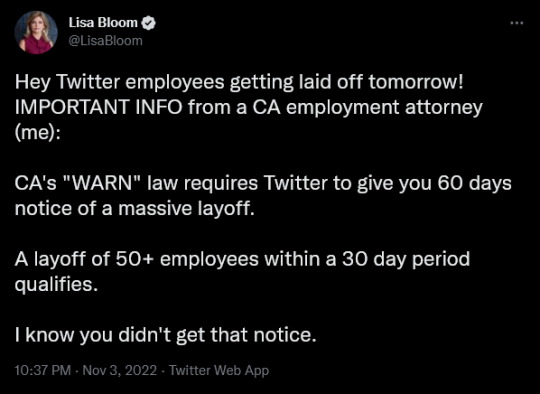
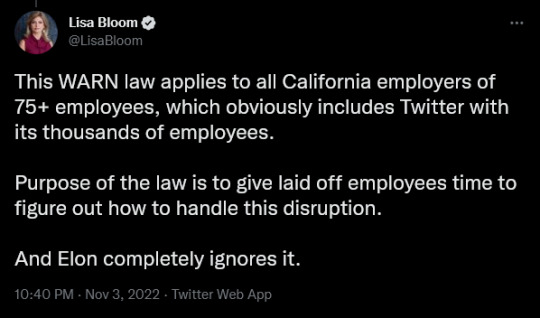
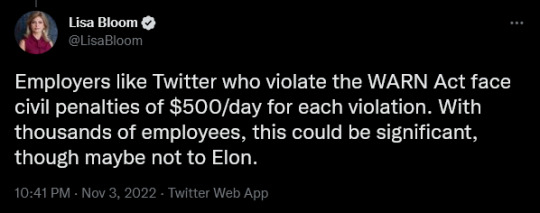
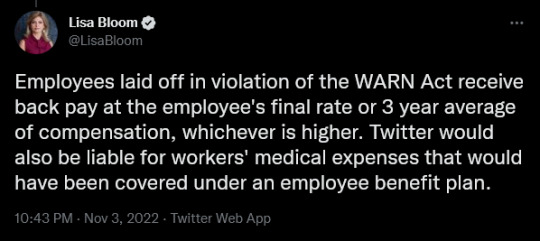



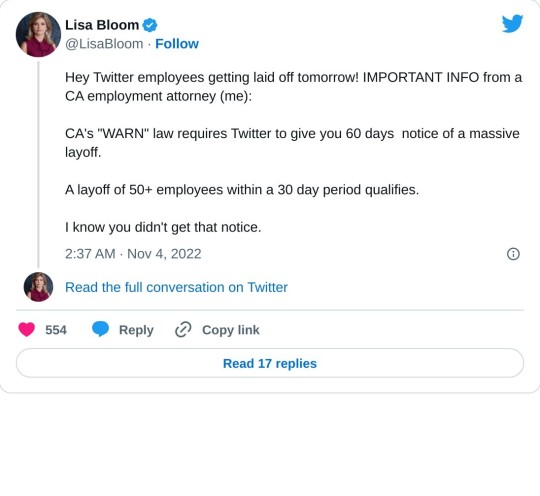
Hey Twitter employees getting laid off tomorrow! IMPORTANT INFO from a CA employment attorney (me):
CA's "WARN" law requires Twitter to give you 60 days notice of a massive layoff.
A layoff of 50+ employees within a 30 day period qualifies.
I know you didn't get that notice.
This WARN law applies to all California employers of 75+ employees, which obviously includes Twitter with its thousands of employees.
Purpose of the law is to give laid off employees time to figure out how to handle this disruption.
And Elon completely ignores it.
Employers like Twitter who violate the WARN Act face civil penalties of $500/day for each violation. With thousands of employees, this could be significant, though maybe not to Elon.
Employees laid off in violation of the WARN Act receive back pay at the employee's final rate or 3 year average of compensation, whichever is higher. Twitter would also be liable for workers' medical expenses that would have been covered under an employee benefit plan.
Twitter will be liable for all of these (civil penalties, lost compensation, lost medical and other benefits) & attorneys' fees for the 60 days it failed to give workers notice.
This flagrant violation of workers rights is outrageous.
Who's in for a class action? LET'S DO THIS
Also, CA's strong antidiscrimination laws apply to Twitter's big layoff tomorrow. Are people of color, women and/or older workers disproportionately chosen, for example?
This was done so hastily, so slapdash, so that the world's richest man can get even richer faster.
We'll see how long Twitter lets my posts stay up. If they take them down tonight, before the layoffs, that means they were on notice of the law I cite and chose to punish me rather than follow it.
That's consciousness of guilt and I'd use it as the basis for punitive damages.
#twitter#twitter lay offs#twitter layoffs#twitter firings#elon musk#class action lawsuit#workers rights#twitter workers rights#labor rights#Lisa Bloom#california labor laws
9K notes
·
View notes
Text
An Oakland-based Popeyes franchisee operating restaurants in the East Bay and San Joaquin County was expected to pay hundreds of thousands of dollars after a federal investigation found that minors as young as 13 years old were allegedly working at the fast-food chain restaurants, the Department of Labor announced Wednesday.
#news#labor news#us news#california news#oakland#california#us pol#uspol#child labor laws#child labor#us department of labor#popeyes
74 notes
·
View notes
Text
Newsom's UI Veto Is a Sign of CA's Dysfunction on UI
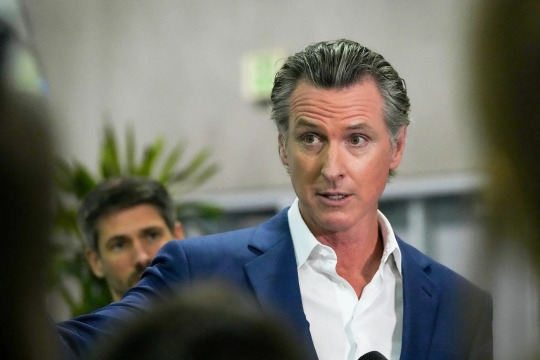
Introduction:
While I'm not yet up to a full blogpost, I thought I'd chime in on social media to buttress a point that my colleague Erik Loomis made in regards to Gavin Newsom's veto of the Unemployment Insurance strike bill. While Erik is absolutely correct that Newsom's veto is a pretty nakedly anti-union move, (especially in the wake of a major entertainment industry strike in which management attempted to use the threat of eviction and foreclosure to break the union), I think the veto also reflects the dysfunction in the California Unemployment Insurance system.
California's UI System:
Back when I was a freelance policy analyst in grad school, I had the opportunity to write about a wide range of topics in social and economic policy - and it just so happened that one of those topics was unemployment insurance.
One of the problems with the U.S' social insurance system is that, because UI is a joint Federal-state program that's financed by state payroll taxes that are then forgiven against Federal taxation (or in the case of the pandemic or the Great Recession, Federal loans), there is a powerful incentive for states to under-tax and under-finance their UI systems and rely instead on the Federal backstop to keep the system ticking over.
For all of California's progressive reputation, it actually ranks towards the bottom of the national league tables when it comes to underfunding its UI system:
"Unemployment benefits in California are funded by a payroll tax on businesses, but the tax is so low and generates so little revenue that the state had to borrow $20 million from the federal government to provide benefits during the pandemic.
In a veto message, Mr. Newsom said that $302 million in interest is due on the federal loan in September alone. “Now is not the time to increase costs or incur this sizable debt,” he said." (source)
To be fair, California is not absolutely terrible - it's not Texas or Mississippi or Alabama - and a lot of its current predicament has to do with how hard California was hit by the COVID-19 pandemic, but even in good times, California taxes itself so lightly that it routinely owes the Federal government UI money. This creates another reason/excuse for the state government to not follow the California Labor Federation's lead and transform the UI system into something that can fight not just poverty but all forms of economic exploitation.
State Capacity:
Now, to my mind, this only makes it more imperative for the state to get its act together - and a big part of that is adopting labor's proposal for decoupling strikes and starvation through the UI system. As I see it, that goes hand in hand with raising minimum benefit levels, such that UI plus strike pay should allow people to live with dignity even during a long strike of 5-6 months duration, improved administration so that people don't have to wait three weeks to actually get their hands on their own money, and improved financing so that the system as a whole can actually work as an automatic stabilizer in economic crises.
To me, this is the essence of community unionism: we work to improve the lives of our members, and in so doing improve the lives of the entire community.
#u.s politics#california#california politics#gavin newsom#unemployment insurance#labor unions#trade unions#labor law#wga strike#sag aftra strike#social insurance
47 notes
·
View notes
Text
#Buy California & Federal Labor Law Posters#Buy California Labor Law Posters#Buy California Labor Law Posters 2024#Federal Labor Law Posters
0 notes
Text
0 notes
Text
Several Labor Law Basics for the State of California
#California#Labor Law#Law#Minimum Wage#Misclassification#Overtime Pay#Paid Vacations#Wage Law#Workers' Compensation
0 notes
Text
"While Republican-controlled state legislatures have rolled back child labor protections this year, Democratic lawmakers and rights advocates in California on Monday celebrated Gov. Gavin Newsom's signing of a first-of-its-kind law that they say will make young people less vulnerable to workplace abuses by teaching them about labor protections." Common Dreams opens with in the article linked above.
0 notes
Text
How Does the Fair Labor Standards Act Protect Employees?
In 1938, the Fair Labor Standards Act was passed which protects employees’ rights to fair wages. Also known as the FLSA, this law protects employees by placing regulations on interstate commerce employment. It oversees things like child labor, minimum wage, and overtime pay; and has standards for both salaried employees and those paid by the hour.
What is the Fair Labor Standards Act?
The FLSA is a federal law that oversees wage regulations for both full and part time employees whether they are employed by a private company or government employer. It regulates things such as the minimum wage, child labor, recordkeeping, and overtime. Federal minimum wage was increased to $7.25 in 2009 and has not been raised since. Generally, if employees work more than forty hours per workweek, they should be paid ‘time and a half’ which is 1.5 times their regular rate of pay.
Who is Protected By the FLSA?
The Fair Labor Standards Act protects employees of public agencies, interstate commerce, production of commercial goods, domestic service, hospitals, schools, and other education facilities. Independent contractors and volunteers are not legally considered employees, and as such, are not protected by the standards and regulations of the FLSA. Employees who are eligible for overtime compensation are required to complete a record of their attendance and times worked.
Primary Areas of Coverage in FLSA
Minimum Wage – The FLSA maintains the federal minimum wage. As of 2009, the minimum wage has been $7.25 per hour. While states are free to set their own minimum wage rates, the only states with a minimum wage lower than the federal rate are Georgia and Wyoming. Both states pay a minimum wage of $5.15 per hour, although employers who are subject to FLSA regulations are required to pay no less than the federal minimum.
Overtime – If an employee is sixteen or older, they may work as many hours as their employer allows. However, if an employee works more than forty hours in a workweek, they may be entitled to overtime pay. Overtime pay must be at least one and a half times the normal hourly rate of pay for the employee.
Hours Worked – The FLSA oversees all time that an employee is doing their job either on site, on duty, or at a designated location.
Recordkeeping – The FLSA requires that employers keep accurate records of employee timecards and payroll. They must also have an official poster of FLSA requirements displayed for employees.
Child Labor – The FLSA maintains regulations that ensure that work does not interfere with a child’s education or best interests. It also limits the types of jobs that children can work and the conditions they can work under.
FLSA Minimum Wage Protections
Though the FLSA maintains a federal minimum wage of $7.25 per hour, many states have instituted their own laws that set their own minimum wage. The FLSA does not govern state law outside of provisions that are in line with preexisting FLSA requirements.
California Minimum Wage
As of January 2023, the state imposed minimum wage in California is $15.50 per hour for all employers. In the past, employers with 26 or more employees were required to pay slightly more than employers with fewer employees. California minimum wage has been rising steadily for years now:
Minimum Wage by Year
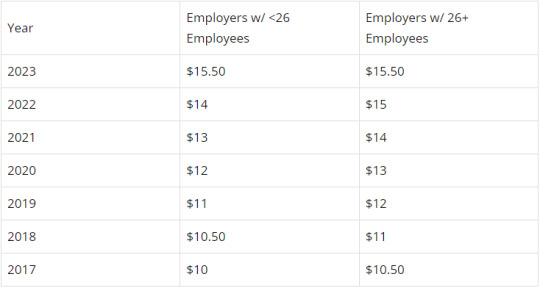
FLSA Overtime Protections
The FLSA maintains that an employer must pay covered non-exempt employees time and a half for any time worked over forty hours in a given work week. This does not include paid time off. A work week might not line up with what is considered a calendar week but is a fixed increment of 168 hours. While the work week may vary for different employees, employers are prohibited from averaging hours beyond the confines of a given work week. Furthermore, overtime pay must generally be paid out on the pay period in which it was earned.
Classifying Employees Under FLSA
It is important to know whether a worker is an employee or an independent contractor. Not only are there differences in the rights and benefits, but employers may face fines and legal action if they are caught misclassifying their workers. There are many questions that can be asked to help determine if a worker is an employee or an independent contractor:
Does the employer or the worker determine when and how the work is done?
Does the employer or the worker determine what the worker’s responsibilities are?
Does the employer or the worker provide the supplies and equipment needed?
Does the employer or the worker pay the payroll taxes?
Does the employer or the worker set the rate of pay?
Who is Exempt from Minimum Wage & Overtime Wages?
If an employee is considered nonexempt, then their employer is required to pay them overtime. If an employee is considered exempt, then their employer is not required to pay them overtime. While there are some jobs that are considered exempt in of themselves, there are three conditions that must be met to determine if an employee is considered exempt, such as:
The amount the employee is paid – Generally $35,568 or more a year
The way they are paid – Generally salary
The type of work performed – As defined by FLSA regulations
Freelance workers and independent contractors are not covered by the FLSA. Employers with less than $500,000 a year in sales as well as small farms that do not engage in interstate commerce are also exempt. Other exempt workers also include:
Executives who manage at least two people and authorize job status of others
Administrators who directly work for management and control their own work duties
Outside salespeople who work primarily offsite and on commission
Computer workers paid at least $684 weekly by salary or fee basis
Workers employed by seasonal recreation establishments
Employees of small local newspapers including delivery workers
Sailors on foreign vessels
Personal caregivers such as homecare aides and babysitters
Employees working under an apprenticeship
Record Keeping That Meets FLSA Standards
When an employer is covered by the FLSA, they must keep detailed records for their non-exempt employees. While there is no uniform standard for how these records are kept, there are specific pieces of information that need to be recorded with complete accuracy for each employee:
Full Name
Social Security Number
Date of Birth (employees under 19)
Sex
Occupation
Start of Workweek Day and Time
Daily Hours Worked
Workweek Hours Worked
How wages are paid
Pay Rate by Hour
Total Straight-time Earnings
Workweek Overtime Earnings
Wage Deductions and Additions
Wages per Pay Period
Dates of Pay Period
Date of Payment
Different types of records must be kept on file for different lengths of time. Payroll, collective bargaining agreements, and sales or purchase records must be kept for at least three years. Things like timecards, work schedules, and other methods for computing wages must be kept for at least two years. These records should be kept on site or at a central record keeping office. Employers are required to make these records open and available for Division inspection.
How FLSA Defines and Regulates Hours Worked
The law defines the word ‘employ’ as “to suffer or permit to work”. The time that an employee spends on site or on duty is considered part of their workweek. The workday begins when the employee first starts working and ends when the employee completes their work. The workday often includes more than just hours worked. There are many different classifications of hours under the FLSA and variables that determine if they are considered working hours.
Waiting – There are two different kinds of waiting time. Being engaged to wait is considered work time such as short periods of down time between tasks. Waiting to be engaged is not considered work time such as free time between jobs.
On Call – An employee is considered working while on call if they are required to stay on site. Generally, if an employee is free to go about their day, they are not considered working while on call. The extent of that freedom may change whether or not the employee is considered working.
Breaks – Short breaks, often five to twenty minutes, are generally considered to be part of hours worked and are paid time. Employers may implement their own consequences for employees taking extended breaks and may be permitted to not count the extra time as time worked. Meal breaks, often thirty to sixty minutes, are usually not considered to be part of hours worked and are unpaid so long as the employee is completely free of their work responsibilities while on break.
Sleep – If an employee is on duty for shifts of twenty-four hours or longer, they may negotiate unpaid sleeping breaks with their employer. These breaks must be more than five and less than eight hours and the employer must provide a proper sleeping area. For shifts shorter than twenty-four hours, authorized sleeping breaks are considered time worked.
Training & Meetings – There are four factors that must apply in order for a meeting or training program to be unpaid: Outside of working hours, attendance is voluntary, unrelated to the employee’s job, and no work is required to be done.
Daily Commute – Regular travel time from home to work and back is not considered hours worked.
One Time Extended Commute – If an employee routinely works at one location and is required to go to another location in another city for a day, the additional commute time may be considered time worked. Employers are permitted to exclude the employee’s normal commute time from those hours.
Daily Travel – Some jobs may require travel as part of the employee’s duties such as deliveries or traveling between job sites. This travel time is considered hours worked.
Trips – If an employee is required to travel for work and is kept away overnight, this is considered travel away from home and is hours worked. Not only is working time counted, but also work hours on days off while away.
FLSA Regulations on Child Labor
There are many restrictions on the type of work that employees under eighteen years old may be permitted to perform as well as the conditions under which they are permitted to work. The FLSA does not allow minors to work jobs that they consider hazardous to the minor’s wellbeing or education. There are also restrictions governing the hours a minor is allowed to work and the breaks they must be provided. Each state also has their own laws regulating child labor that employers should be aware of.
Recent FLSA Updates
The 2018 amendments to FLSA regarding tipped employees were updated in 2020 and 2021. The new regulations forbid employers from taking any part of the employee’s tips and also updated the restrictions on when an employer can alter an employee’s pay based on earned tips.
The Joint Employer Rule was rescinded in July of 2021.
The United States Department of Labor recently began proposal of a new rule to update the regulations and guidelines for determining if a worker is an independent contractor or an employee in accordance with the FLSA. This rule was proposed in October of 2022, replacing the January 2021 rule with a more accurate and precise method for classification. The rule is considered mutually beneficial for both workers and employers, reducing the risk of employee misclassification, and increasing employer confidence and peace of mind when hiring independent contractors.
Common Violations of FLSA
Unfortunately, there are many ways in which employers can and do violate the Fair Labor Standards Act:
Misclassification – Employers may sometimes classify an employee as exempt based on their job title or type of pay rate even though the job duties and amount of pay indicate that the employee is nonexempt. It is important for employers to be mindful of all the variables of a situation and for employees to be well informed of their rights.
Not compensating off the clock work – When an employee works beyond their scheduled time, even if they are clocked out, that is still considered hours worked and the employee should be compensated. Even if the employer did not request or permit the off the clock work, they are still responsible for paying the employee.
Not compensating working breaks – When an employee is expected to be on call through their breaks, or works through their lunch, that time is considered hours worked and the employee must be compensated. In order for a break to be unpaid, the employee must not be performing any job-related duties such as cleaning, replying to emails, or interacting with clients.
Overtime waivers – If an employer has an employee sign a document waiving their right to overtime pay, that document is invalid and unenforceable.
Averaging workweeks – Sometimes, an employer may average out the number of hours an employee has worked over two or more weeks to avoid paying overtime. If an employee takes a day off one week and then works an extra eight hours the next week, the employer may average those hours out to say the employee worked forty hours each week. This may seem mathematically logical, but it is actually legally prohibited.
What to Do If Your Employer Violates the FLSA
Because there are employers who will violate FLSA, employees must be aware of the options available to them and the steps to take if they find themselves in such a situation. Complaints regarding FLSA violations can and should be filed with the Department of Labor’s Wage and Hour Division.
The WHD investigates violation claims by having a representative conduct interviews with the employer and various employees, research payroll and timecard documents, and gather any other information that may indicate if a violation has been committed.
The person who files the complaint does not need to be the person against whom the violation was committed. Anyone who witnesses their employer violating the FLSA may report that violation.
It is prohibited for an employer to retaliate against an employee who has filed a complaint or participated in an investigation against them.
How to File FLSA Complaint
When filing a complaint with the WHD, there are several details you will need to provide:
Your name
Your address
Your phone number
The company’s name, address, and number
Owner/employer/manager name
Your job duties
Your pay rate and method
It is good to be as detailed as possible when providing information. Your complaint is the starting point of their investigation. When filing a complaint as a third party, you may not have all of the information needed, but it is important to share as much as possible.
Contact Mesriani Law Group if You Have Experienced a FLSA Violation
The Fair Labor Standards Act exists to protect workers and their right to fair wages. All too often, employers try to circumvent the law and get away with cheating their employees out of the money they’ve earned. When these violations occur, employees have the right to file complaints against their employers. If you are facing retaliation for filing a claim with the Department of Labor or participating in an investigation against your employer, call Mesriani Law Group today for a free consultation.
Fair Labor Standards Act FAQs
What are the four main elements of the FLSA?
There are four primary areas established and enforced by the Fair Labor Standards Act. Establishing and enforcing minimum wage, overtime pay, regulations for recordkeeping, and regulations for child labor. While some jobs and employees may not be covered by the FLSA or exempt from overtime, the act generally applies to part time as well as full time workers of both private and government employers.
What are some common mistakes made under FLSA?
Whether intentional or accidental, there are employers who do not adhere to the regulations set forth by the FLSA. One of the most common mistakes employers make is misclassifying their employees. Not paying overtime properly and allowing employees to work off the clock or during their breaks without compensation are also violations that occur far too often. It is important for everyone on both sides of an employment relationship to be familiar with the law and how it applies to them.
What is not regulated under the Fair Labor Standards Act?
There are several aspects of employment that the Fair Labor Standards Act does not oversee. This includes but it not limited to things like the payment of wages in excess of FLSA requirements, lunch and rest breaks, termination letters, and final payments for terminated employees. The FLSA also does not regulate paid time off. It is important to also be aware of state laws and regulations pertaining to all employment matters.
#California Employment Law#Fair Labor Standards Act#FLSA#Employment Law#Employment Lawyers#California Attorneys
0 notes
Text
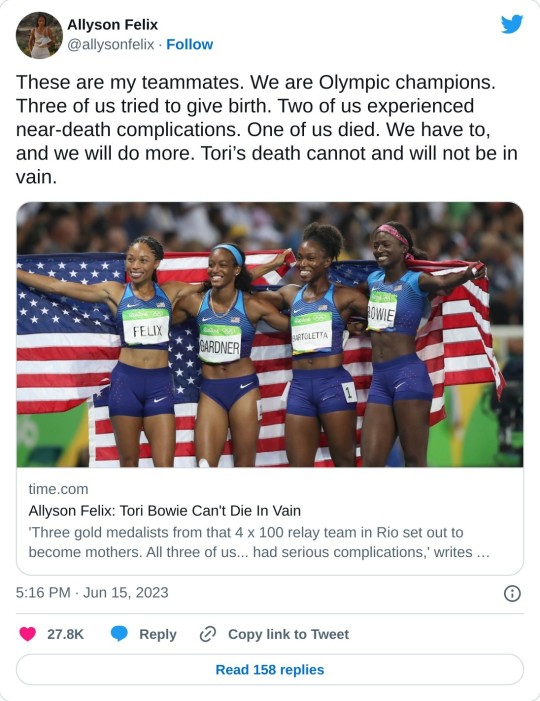
My former U.S. Track and Field teammate Tori Bowie, who was found dead in her home in Florida on May 2, of complications related to childbirth at 8 months pregnant, was a beautiful runner. She was effortless. At the Rio Olympics, I ran the second leg of the 4 x 100 relay. Tori was the anchor. When she got the baton, I remember thinking, “it’s over.” She just accelerated. When she crossed the finish line, I couldn’t wait to run over to her to celebrate. It was her first, and only, Olympic gold medal.
She also picked up a silver (in the 100-m) and bronze (200-m) in Brazil. The next year, at the 2017 World Championships in London, Tori won the 100-m title, earning the title of “world’s fastest woman.” Tori started out as a long jumper. So seeing her thrive as a sprinter was a huge deal. She was just such a bright light, and people were getting to see that.
Tori grew up in Mississippi and had this huge Southern accent. She didn’t take herself too seriously. You felt this sense of ease when you were around her. I last saw her in early 2021, in San Diego, where she was training. She gave me the biggest hug; something about her spirit was just very, very sweet. I felt her sweetness come over me that day.
Tori was 32 when she died. According to the autopsy, possible complications contributing to Bowie’s death included respiratory distress and eclampsia—seizures brought on by preeclampsia, a high blood pressure disorder that can occur during pregnancy. I developed preeclampsia during my pregnancy with my daughter Camryn, who was born in November 2018. The doctors sent me to the hospital, where I would deliver Camryn during an emergency C-section, at 32 weeks. I was unsure if I was going to make it. If I was ever going to hold my precious daughter.
Like so many Black women, I was unaware of the risks I faced while pregnant. According to the CDC, in 2021 the maternal mortality rate for Black women was 2.6 times the rate for white women. About five days before I gave birth to Camryn, I was having Thanksgiving dinner with my family. I mentioned that my feet were swollen. As we went around the table, the women shared their experiences during pregnancy. My cousin said she also had swollen feet. My mom didn’t. Not once did someone say, ‘oh, well, that’s one of the indicators of preeclampsia.’ None of us knew. When I became pregnant, my doctor didn’t sit me down and tell me, ‘these are things that you should look for in your pregnancy, because you are at a greater risk to experience these complications.’
That needs to change, now, especially in light of Tori’s tragic passing. Awareness is huge. Serena Williams had near-death complications during her pregnancy. Beyoncé developed preeclampsia. I hate that it takes Tori’s situation to put this back on the map and to get people to pay attention to it. But oftentimes, we need that wake-up call.
The medical community must do its part. There are so many stories of women dying who haven’t been heard. Doctors really need to hear the pain of Black women.
Luckily, there’s hope on several fronts. Congress has introduced the Momnibus Act, a package of 13 bills crafted to eliminate racial disparities in maternal health and improve outcomes across the board. California passed Momnibus legislation back in 2021. These laws make critical investments in areas like housing, nutrition, and transportation for underserved communities. Further, several pharmaceutical companies are making advances on early detection and treatment of preeclampsia.
Three gold medalists from that 4 x 100 relay team in Rio set out to become mothers. All three of us—all Black women—had serious complications. Tianna Madison has shared that she went into labor at 26 weeks and entered the hospital “with my medical advance directive AND my will.” Tori passed away. We’re dealing with a Black Maternal Health crisis. Here you have three Olympic champions, and we’re still at risk.
I would love to have another child. That’s something that I know for sure. But will I be here to raise that child? That’s a very real concern. And that’s a terrifying thing. This is America, in 2023, and Black women are dying while giving birth. It’s absurd.
I’m hopeful that things can get better. I’m hopeful that Tori, who stood on the podium at Rio, gold around her neck and sweetness in her soul, won’t die in vain.
—as told to Sean Gregory
#Tori Bowie#Black Lives Matter#Black Mothers Health#Black Maternal Health#Allyson Felix: Tori Bowie Can't Die In Vain#Black Lives of Children Matter#Black Health Matters
11K notes
·
View notes
Video
California labor laws for salaried employees are that employees who work over the maximum number of hours should be paid based on California overtime laws. Visit: https://bartzlawgroup.com/how-do-you-determine-if-an-employee-is-exempt-in-california/ to know laws of employees. For more details, watch this video.
0 notes
Text
OSHA Workplace Safety Training, Consultancy: PCS Safety, California
PCS Safety: Providing quality workplace safety services Company & training including OSHA training to public/private sectors in California and throught United States..
Cal OSHA safety training for Workers – cal osha training coursesA Mandate: The Cal OSHA training module ensures that cal osha safety training workers are eligible for workplace safety osha citation for their positions regardless of industry. Its Known as california safety training
osha citation response Importance of Safety Work Permit by PCS safety Inc - osha certification California A safe system of work permit is an effective vehicle for communicating critical safety information. Safe Lifting Poster- Employers are encouraged to post this guide osha license to help workers follow OSHA’s ergonomic compliance and meet OSHA’s mandatory training requirement.
osha 40 hours- 40 hour hazwoper
labor law posters california - First Aid Compliance for Your first aid training Workplace California Forklift Certification Requirements for Employers workplace first aid What is PSM – Process Safety Management Program, is it Important
Injury and Illness Prevention (IIP) Program Plan Kit : Under Title 8 of the California Code of Regulations (T8CCR) Section 3203, every California employer is required to have a documentable llness injury preventino program kit. At PCS Safety, Inc., osha injury and illness prevention program our Injury and Illness Prevention Plan Kit injury and illness prevention program osha will help you prepare and meet the legal requirements. The first step is conducting injury illness prevention program california the OSHA Inspections & Citation Representation, injury illness prevention program Citation & Appeals.
CAL-OSHA COMPLIANCE TRAINING
Cal OSHA Compliance Training : The Safety Program or Illness and Injury Prevention Program as required by Cal OSHA training requirements must encompass the following elements:
1)Compliance 2) Communication 3) Hazard Assessment 4) Accident/Exposure Investigation 5) Hazard Correction 6) Training and Instruction 7) Record-keeping Compliance is cal osha training courses something every organization with one or more employees must comply with all of the above-mentioned requirements. Cal OSHA Training materials (e.g., interactive videos, online training, and more) that address the topics required by OSHA, are vital documents that you need to prepare, as well as emergency response plans.
#"llness injury preventino program kit#osha injury and illness prevention program#injury and illness prevention program osha#illness prevention program#injury illness prevention program california#injury illness prevention program#cal osha training requirements#cal osha compliance training#cal osha training courses#cal osha training materials#cal osha safety training#cal osha training#california safety training#safety work permit#safe lifting poster#labor law posters California#first aid compliance#california forklift certification requirements#process safety management program
1 note
·
View note
Text
Five New Employment Laws that Every California Employer Should Know
Five New Employment Laws that Every California Employer Should Know
A new year brings new employment laws for California employers. California employers will want to begin revising employee policies and handbooks now, so that they are prepared to comply with these new laws when the majority of them go into effect on January 1, 2023. Here are five new employment laws that every California employer should know:
AB 1041 (Expanded Definition of “Family Member” for…

View On WordPress
#bereavement leave#business#California#Cannabis#Employment Law#government#labor and employment#Labor Law#legal#legislation#Marijuana#paid time off#salary disclosure#sick leave
0 notes
Text
Trucker protest shuts down operations at California port | Business News
Trucker protest shuts down operations at California port | Business News
If you know of local business openings or closings, please notify us here.
PREVIOUS OPENINGS AND CLOSINGS
· Jimmy’s Barbershop in Allentown has moved to 822 N. 19th Street
· Air Products and Chemicals Inc.’s chosen warehouse developer, Prologis Inc., will have to wait until July 13 for a final decision by Upper Macungie Township’s zoning hearing board on 2.61 million square feet of warehouses.
·…

View On WordPress
#apmediaapi#business#california port-trucking protest#dcc#economy#general news#government and politics#government business and finance#government regulations#Industrial products and services#industry regulation#labor economy#labor issues#labor regulation#laws#Legislation#legislature#political and civil unrest#port operation#protests and demonstrations#shipping#social affairs#social issues#Traffic#Transportation#Transportation and shipping#transportation industry regulation#transportation infrastructure#trucking#wire
0 notes
Quote
On August 11, day 102 of the 11,500-person Writers Guild of America (WGA) strike, which has largely shut down the film industry coast to coast, aided by below-the-line workers respecting picket lines and bolstered by 160,000 members of the Screen Actors Guild-American Federation of Television and Radio Artists (SAG-AFTRA), who initiated their own strike on July 14, the studios finally returned to the bargaining table.
The Alliance of Motion Picture and Television Producers (AMPTP), the organization that bargains on behalf of the major studios, offered counterproposals, a long-awaited response to the WGA’s proposals. The two sides met the following week and continued to exchange proposals.
Then, on August 22, day 113 of the WGA strike, the two sides met again, but with an important addition: previous negotiating sessions had been led by AMPTP president Carol Lombardini, the studios’ hired hand, while at this one, the bosses who make the decisions were in the room.
Disney CEO Bob Iger, Warner Bros. Discovery CEO David Zaslav, Netflix co-CEO Ted Sarandos, and NBCUniversal’s Donna Langley came to the table to face the WGA’s elected leadership in the room outside of the AMPTP’s Sherman Oaks, California, headquarters where the negotiations have taken place. Workers, suffering the devastating effects of a months-long strike, hoped that the studios might finally offer counterproposals that meet their needs. Instead, the bargaining session led to further unraveling.
“We accepted [the] invitation and, in good faith, met tonight, in hopes that the companies were serious about getting the industry back to work,” wrote the WGA negotiating committee in a message to members following the meeting. “Instead, on the 113th day of the strike — and while SAG-AFTRA is walking the picket lines by our side — we were met with a lecture about how good their single and only counteroffer was.”
The two sides had agreed to adhere to a media blackout, vowing not to leak information about the proposals to third parties. Yet immediately following the August 22 session, the AMPTP publicly released a document highlighting elements of their counterproposal.
“This was a meeting to get us to cave,” said the WGA leadership, “which is why, not twenty minutes after we left the meeting, the AMPTP released its summary of their proposals.”
The Hollywood Studios Still Aren’t Serious About Ending the Writers’ Strike
These sociopath CEOs are hearing it from shareholders, who want us to get back to work. The shareholders are making it clear that the psychopath CEOs can release the LESS THAN ONE PERCENT of their compensations to get us back to work.
So the sociopath CEOs put on a big show of coming back to bargain and work this out ... and when the WGA sits down to bargain, these sociopath CEOs have the fucking nerve to just lecture the WGA about how great their absolute garbage offer is. The offer WGA rejected because it didn’t address any of the issues on the table.
These sociopath CEOs are the problem:
Disney CEO Bob Iger, Warner Bros. Discovery CEO David Zaslav, Netflix co-CEO Ted Sarandos, and NBCUniversal’s Donna Langley
These sociopath CEOs are greedy and entitled. That any one of them thought that lecturing WGA, then gaslighting members (in violation of not just the agreed upon media blackout, but likely in violation of labor law) would move us any closer to getting back to work tells you everything you need to know about who the problem is.
Fuck these scumbags, fuck their greed, and fuck their gaslighting.
2K notes
·
View notes
Text
When the app tries to make you robo-scab

When we talk about the abusive nature of gig work, there’s some obvious targets, like algorithmic wage discrimination, where two workers are paid different rates for the same job, in order to trick occasional gig-workers to give up their other sources of income and become entirely dependent on the app:
https://pluralistic.net/2023/04/12/algorithmic-wage-discrimination/#fishers-of-men
Then there’s the opacity — imagine if your boss refused to tell you how much you’ll get paid for a job until after you’ve completed it, claimed that this was done in order to “protect privacy” — and then threatened anyone who helped you figure out the true wage on offer:
https://pluralistic.net/2021/08/07/hr-4193/#boss-app
Opacity is wage theft’s handmaiden: every gig worker producing content for a social media algorithm is subject to having their reach — and hence their pay — cut based on the unaccountable, inscrutable decisions of a content moderation system:
https://pluralistic.net/2022/12/10/e2e/#the-censors-pen
Making content for an algorithm is like having a boss that docks every paycheck because you broke rules that you are not allowed to know, because if you knew the rules, you’d figure out how to cheat without your boss catching you. Content moderation is the last place where security through obscurity is considered good practice:
https://doctorow.medium.com/como-is-infosec-307f87004563
When workers seize the means of computation, amazing things happen. In Indonesia, gig workers create and trade tuyul apps that let them unilaterally modify the way that their bosses’ systems see them — everything from GPS spoofing to accessibility mods:
https://pluralistic.net/2021/07/08/tuyul-apps/#gojek
So the tech and labor story isn’t wholly grim: there are lots of ways that tech can enhance labor struggles, letting workers collaborate and coordinate. Without digital systems, we wouldn’t have the Hot Strike Summer:
https://pluralistic.net/2022/12/02/not-what-it-does/#who-it-does-it-to
As the historic writer/actor strike shows us, the resurgent labor movement and the senescent forces of crapulent capitalism are locked in a death-struggle over not just what digital tools do, but who they do it for and who they do it to:
https://locusmag.com/2022/01/cory-doctorow-science-fiction-is-a-luddite-literature/
When it comes to the epic fight over who technology acts for and against, we need a diversity of tactics, backstopped by tech operated by and for its users — and by laws that protect workers and the public. That dynamic is in sharp focus in UNITE Here Local 11’s strike against Orange County’s Laguna Cliffs Marriott Resort & Spa.
The UNITE Here strike turns on the usual issues like a living wage (hotel staff are paid so little they have to rent rooming-house beds by the shift, paying for the right to sleep in a room for a few hours at a time, without any permanent accommodation). They’re also seeking health-care and pensions, so they can be healthy at work and retire after long service. Finally, they’re seeking their employer’s support for LA’s Responsible Hotels Ordinance, which would levy a tax on hotel rooms to help pay for hotel workers’ housing costs (a hotel worker who can’t afford a bed is the equivalent of a fast food worker who has to apply for food stamps):
https://www.unitehere11.org/responsible-hotels-ordinance/
But the Marriott — which is owned by the University of California and managed by Aimbridge Hospitality — has refused to bargain, walking out negotiations.
But the employer didn’t walk out over wages, benefits or support for a housing subsidy. They walked out when workers demanded that the scabs that the company was trying to hire to break the strike be given full time, union jobs.
These aren’t just any scabs, either. They’re predominantly Black workers who rely on the $700m Instawork app for gigs. These workers are being dispatched to cross the picket line without any warning that they’re being contracted as strikebreakers. When workers refuse the cross the picket and join the strike, Instawork cancels all their shifts and permanently blocks them from new jobs.
This is a new, technologically supercharged form of illegal strikebreaking. It’s one thing for a single boss to punish a worker who refuses to scab, but Instawork acts as a plausible-deniability filter for all the major employers in the region. Like the landlord apps that allow landlords to illegally fix rents by coordinating hikes, Instawork lets bosses illegally collude to rig wages by coordinating a blocklist of workers who refuse to scab:
https://arstechnica.com/tech-policy/2022/10/company-that-makes-rent-setting-software-for-landlords-sued-for-collusion/?comments=1
The racial dimension is really important here: the Marriott has a longstanding de facto policy of refusing to hire Black workers, and whenever they are confronted with this, they insist that there are no qualified Black workers in the labor pool. But as soon as the predominantly Latino workforce struck, Marriott discovered a vast Black workforce that it could coerce into scabbing, in collusion with Instawork.
Now, all of this isn’t just sleazy, it’s illegal, a violation of Section 7 of the NLRB Act. Historically, that wouldn’t have mattered, because a string of presidents, R and D, have appointed useless do-nothing ghouls to run the NLRB. But the Biden admin, pushed by the party’s left wing, made a string of historic, excellent appointments, including NLRB General Counsel Jennifer Abruzzo, who has set her sights on punishing gig work companies for flouting labor law:
https://pluralistic.net/2022/01/10/see-you-in-the-funny-papers/#bidens-legacy
UNITE HERE 11 has brought a case to the NLRB, charging the Instawork, the UC system, Marriott, and Aimbridge with violating labor law by blackmailing gig workers into crossing the picket line. The union is also asking the NLRB to punish the companies for failing to protect workers from violent retaliation from the wealthy hotel guests who have punched them and screamed epithets at them. The hotel has refused to identify these thug guests so that the workers they assaulted can swear out complaints against them.
Writing about the strike for Jacobin, Alex N Press tells the story of Thomas Bradley, a Black worker who was struck off all Instawork shifts for refusing to cross the picket line and joining it instead:
https://jacobin.com/2023/07/southern-california-hotel-workers-strike-automated-management-unite-here
Bradley’s case is exhibit A in the UNITE HERE 11 case before the NLRB. He has a degree in culinary arts, but racial discrimination in the industry has kept him stuck in gig and temp jobs ever since he graduated, nearly a quarter century ago. Bradley lived out of his car, but that was repossessed while he slept in a hotel room that UNITE HERE 11 fundraised for him, leaving him homeless and bereft of all his worldly possessions.
With UNITE HERE 11’s help, Bradley’s secured a job at the downtown LA Westin Bonaventure Hotel & Suites, a hotel that has bargained with the workers. Bradley is using his newfound secure position to campaign among other Instawork workers to convince them not to cross picket lines. In these group chats, Jacobin saw workers worrying “that joining the strike would jeopardize their standing on the app.”

Today (July 30) at 1530h, I’m appearing on a panel at Midsummer Scream in Long Beach, CA, to discuss the wonderful, award-winning “Ghost Post” Haunted Mansion project I worked on for Disney Imagineering.

If you'd like an essay-formatted version of this thread to read or share, here's a link to it on pluralistic.net, my surveillance-free, ad-free, tracker-free blog:
https://pluralistic.net/2023/07/30/computer-says-scab/#instawork

[Image ID: An old photo of strikers before a struck factory, with tear-gas plumes rising above them. The image has been modified to add a Marriott sign to the factory, and the menacing red eye of HAL9000 from Stanley Kubrick's '2001: A Space Odyssey' to the sky over the factory. The workers have been colorized to a yellow-green shade and the factory has been colorized to a sepia tone.]

Image:
Cryteria (modified)
https://commons.wikimedia.org/wiki/File:HAL9000.svg
CC BY 3.0
https://creativecommons.org/licenses/by/3.0/deed.en
#pluralistic#hot strike summer#unions#UNITE HERE#labor#computer says no#tuyul apps#jacobin#gig economy#nlrb#marriott#Laguna Cliffs Marriott Resort & Spa#instawork#scabs#Aimbridge Hospitality Group#University of California#nlrb section 7#unfair labor practice#ulp#UNITE HERE Local 11#mansion tax#race#algorithmic wage discrimination#Veena Dubal#disciplinary technology#chickenized reverse-centaurs#reverse-centaurs#como is infosec#Jennifer Abruzzo
1K notes
·
View notes
Text

The Employment Lawyer at Melmed Law Group P.C. fight for victims of discrimination in California. Based in Los Angeles, our attorneys have years of experience litigating work discrimination claims. We don't treat people as cases, we care and fight hard for our clients.
Contact
Melmed Law Group P.C. California Employment Lawyers
Email: [email protected]
Website: https://www.melmedlaw.com/employment-lawyer/
Follow Our Social Network:
Facebook: https://www.facebook.com/california.labor.employment.lawyers/
Twitter: https://twitter.com/EmploymentLawy7
Linkedin: https://www.linkedin.com/company/california-employment-lawyers/
Instagram: https://instagram.com/employmentlawyerusa
Pinterest: https://www.pinterest.com/employmentlawyerusa/_saved/
#Employment Lawyer#Employment Attorney#Labor Lawyer#Employment Law Firm#California Employment Lawyer
1 note
·
View note